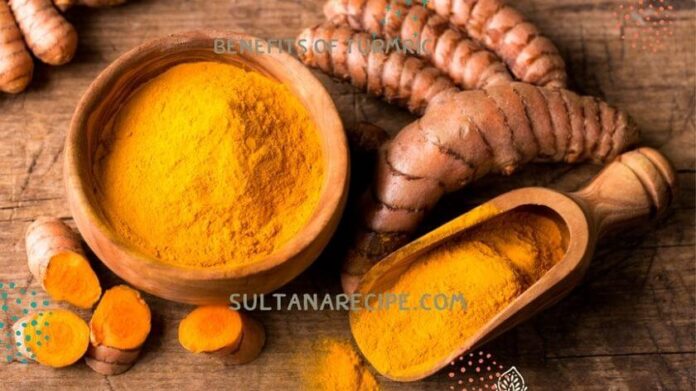Last Updated on December 14, 2022 by Sultana Parvin
Turmeric, a quite common condiment that has been used for cooking in a variety of foods, particularly in the Indian and South Asian traditional dishes. Whereas are we aware of how turmeric itself and its curcuminoid compound namely Curcumin can benefit us? Researchers have found remarkable and stunning health benefits of Turmeric and Curcumin.
Turmeric (Curcuma Longa Linn) contains 2-9% curcuminoid compound, of which almost 75% is curcumin that is said to be an antioxidant powerhouse. This antioxidant can boost our immunity and reduce or curing inflammation to prevent breast, pancreatic, prostate, colorectal, and lung cancers. It can prevent and treat Gastrointestinal diseases and heal from Gut and Irritable Bowel Syndrome.
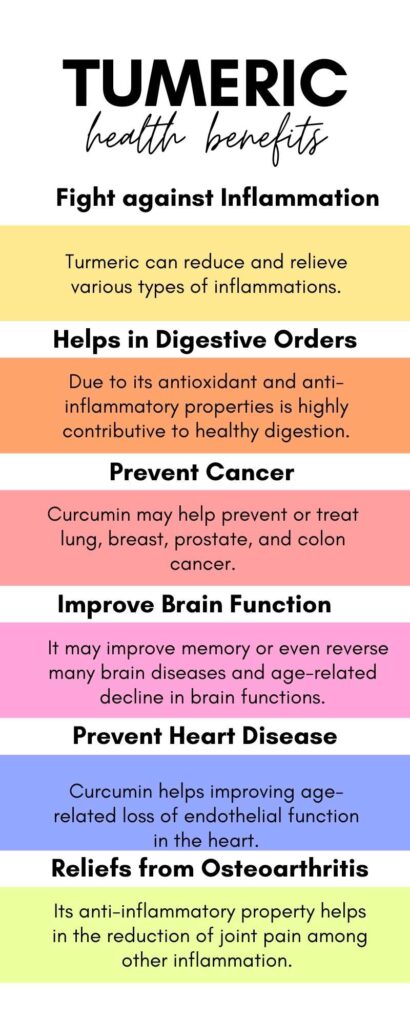
Table of Contents
Turmeric Health Benefits
Some studies have found the effectiveness of curcumin in preventing and improving Type-2 diabetes and reducing the risk of heart disease. Due to its inflammatory properties, curcumin is being advised as a long-term treatment option for Osteoarthritis and Arthritis. It may even improve our memory by reversing brain degeneration, known as Alzheimer’s disease, and be used as an anti-depression treatment agent.
Researchers have also found the effectiveness of turmeric and curcumin as a tonic against obesity and treatment of liver, skin, and age-related eye degeneration. All these exciting health benefits of Turmeric and Curcumin and their medicinal effects are discussed below under 12 headlines.
1. Turmeric and Curcumin Fight against Inflammation
Turmeric has been used as an anti-inflammatory Ayurvedic medicine for centuries. Its main compound curcumin fights against molecules, which cause inflammation. It can reduce and relieve various types of inflammations including stomach ailments, pancreatitis, arthritis, and certain types of cancer. According to research by the US National Center for Biotechnology Information (NCBI), National Library of Medicine (NLM), curcumin with its antioxidant and antimicrobial properties have potential as a therapeutic agent and can be given in place of anti-inflammatory medications such as Advil (ibuprofen) and aspirin[i].
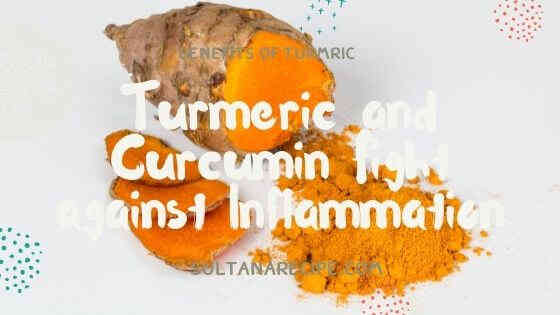
2. Turmeric helps in Digestive Orders
Turmeric due to its antioxidant and anti-inflammatory properties is highly contributive to healthy digestion. Although so long it has been used in South Asia and China as a digestive healing ayurvedic herb, the Western medicine institutes have found its effectiveness for healthy digestion and medicinal effects in the treatment of inflammatory gut and bowel diseases, ulcerative colitis, and improving irritable bowel syndrome (IBS)[ii].
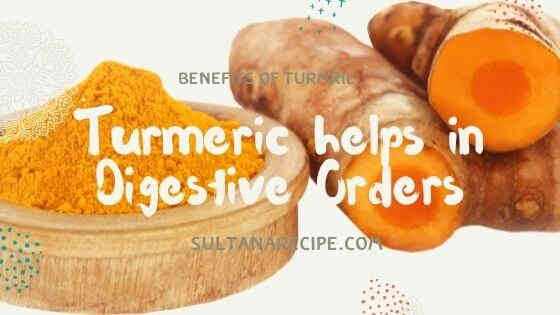
3. Curcumin may Prevent Cancer or Slow Spread of Cancer
Some studies suggest that curcumin may help prevent or treat lung, breast, prostate, and colon cancer. Although there is not enough evidence for recommending it as cancer treatment medicine, research in the laboratory over animals show that curcumin may prevent cancer or slow the process of spreading or developing cancer tumor. Studies also suggest that it may even make chemotherapy more effective and protect healthy cells from damage by radiation or chemotherapy[iii]. Parallelly, we can also protect from the growth of brain cancer cells by regular consumption of garlic, which some people have made a habit of.

4. Curcumin may Improve Brain Function and Prevent Brain Disorder
Our brain functions by the subpopulation of neurons in the peripheral and central nervous systems. The promoter of the subpopulation of neurons is called brain-derived neurotrophic factor (BDNF), a type of hormone which drives the memory cells in our brain. Most common disorders including depression and progressive brain disorder (Alzheimer’s disease) occur due to a decline in the production of this hormone. A research result on animals suggests curcumin has neuroprotective properties which may increase in BDNF[iv]. Although studies on humans are not yet held, the interaction of genes involved in neuronal development, improved brain signals, and metabolism suggest curcumin may improve memory or even reverse many brain diseases and age-related decline in brain functions[v].

5. Curcumin may Prevent Heart Disease
One of the common causes of heart disease is endothelial dysfunction. Endothelial is a thin membrane, which regulates blood pressure inside the heart valves and blood vessels. Curcumin helps to improve the age-related loss of endothelial function in the heart. In one study among 3 groups of postmenopausal women, one group who took curcumin supplements for 8 weeks showed some improvement of their vascular endothelial function as the group who underwent aerobic exercise[vi]. The other group of women with no intervention had no change in their cardiac condition.

6. Curcumin may Prevent Diabetes and Control of Blood Sugar
The impact on human diabetic condition by consumption of turmeric or curcumin is not yet proven. But scientists are hopeful that curcumin may be potentially helpful in controlling blood sugar levels and preventing diabetes-related kidney disease[vii]. A study of feeding tetrahydro-curcumin (a major substance of curcumin) to rats with type 2 diabetes led to the significant reduction of blood sugar and an increase in plasma insulin in 45 days[viii]. Although, more research is needed on humans for a clear recommendation on this. However, turmeric is certainly helpful in the prevention of type 2 diabetes from prediabetic conditions by controlling metabolic syndrome or obesity (also called type 2 diabetes mellitus), which is rapidly increasing globally.

7. Turmeric and Curcumin helps in Reducing Weight and Body Shaping
Today, metabolic syndrome or gaining excessive weight is an increasing trend, which is affecting almost 20% of the total population worldwide. In research, curcumin intake significantly reduced body mass index (BMI) and waist circumference (WC). This treatment also resulted in a reduction of leptin (a hormone protein produced by fat cells which creates appetite and fat storage), mainly responsible for excessive food intake and deposition of fat in our body. This finding was concluded through 21 studies on 1604 individuals in 2018[ix]. The result of the research shows, turmeric or curcumin can help in the management of obesity and maintaining body shape preventing excessive gain of BMI and WC.

8. Curcumin Reliefs from Osteoarthritis and Arthritis pain.
Osteoarthritis is one of the most common bone degenerations causing pain and stiffness in the knee, thumb, and hip joints among the middle age onward people. Turmeric with its anti-inflammatory property helps in the reduction of joint pain among other inflammation. It is also found to be more effective than an anti-inflammatory drug in some cases. Besides, the research of the previous study of curcumin intake on metabolic syndrome found a significant increase in adiponectin (another protein hormone produced by fat cells). Adiponectin relieves inflammation and reduces the formation of fatty deposits in the arteries, which enhances the response of cells to insulin levels (also known as atherogenesis)[x].

9. Curcumin Protects Liver Function and Can Treat Liver Diseases
An experiment of regular consumption of curcumin (70 mg/day) for 8 weeks was found to be effective in the decline of liver fat to non-alcoholic fatty liver disease (NAFLD). Another systematic review on oxidative stress (the major cause of liver damage) shows that curcumin can be effective in various types of oxidative liver disorders. Curcumin is found potentially attributive to hepatotoxicity, non-alcoholic steatohepatitis, alcoholic liver disease, liver fibrosis and cirrhosis, and hepatic injury. Upon detailed experiment, it was concluded that curcumin has preventive and curative effects against oxidative stress-related liver diseases. It is also recommended as a safe and effective natural product for oxidative liver diseases[xi].
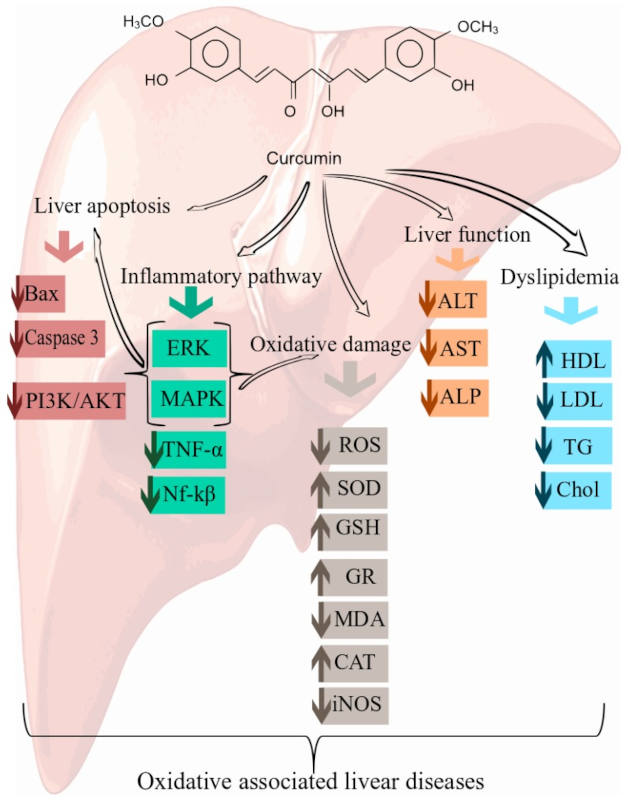
10. Turmeric and Curcumin may be used as Anti-Depression agents
Depression is also another resultant effect due to a drop in the levels of BDNF that promotes neuron hormones for functioning our brain. Curcumin is found to be an effective complementary anti-depressive agent while treated in combination with other medications. It was revealed in a preliminary clinical test among 60 patients with major depressive disorders (MDD). The group was given 1000 mg curcumin with fluoxetine (20 mg) showed better improvement than the other 2 groups with either fluoxetine or curcumin only[xii].

11. Turmeric as a Useful Therapeutic Treatment for Skin Care
Although mainstream dermatology is yet to recognize therapeutic treatment, growing scientific evidence suggests the effectiveness of curcumin for chronic and inflammatory skin, acceleration of wound closure, skin infection, and cosmetic ailments including dyspigmentation[xiii]. Besides oral intake, the application of turmeric directly on the affected tissue can be useful in treating skin-related disorders. Curcumin may also be used for protection against various pollutions, free radicals, and cytotoxic agents as a skincare therapeutic ingredient.

12. Turmeric and Curcumin as Anti-aging and Eye Degeneration Supplement
At present, there is no evidence of whether turmeric or curcumin can enhance human longevity. But, with its effectiveness against inflammation, heart-related diseases, brain degeneration, or capability of delaying the growth of cancer tumors and protecting the body against free radicals, turmeric or curcumin directly or indirectly perform as an anti-aging supplement.

In preliminary scientific research published in 2018 shows curcumin-loaded nanoparticles have exiting potential in overcoming ocular barriers and it may help treatment of glaucoma, which is the leading cause of blindness among the aged (over 60 years) people[xiv]. Besides, curcumin has been found beneficial in the treatment of several other ocular diseases, such as diabetic retinopathy, age-related eye degeneration, and dry eye syndrome, etc.
Concluding Remarks
Turmeric has so far been used in Ayurveda or folk treatment for common ailments such as facial, gynecological problems, gastric, hepatic, infectious, or blood disorders. But the modern medical science has established amazing health benefits of Turmeric and Curcumin in the prevention and treatment of various diseases as discussed above.
Studies have found both oral intake and topical use of turmeric and curcumin are safe. US FDA has approved curcuminoids as “generally recognized and safe (GRAS)”, and their toxicity profile has been documented through several clinical trials, even with high doses (4,000 to 8,000 mg/day). However, some minor negative side effects like headache, diarrhea, rash, etc. are reported at higher doses.
Generally, turmeric or curcumin doses range between 0.5 to 3 gm per day. You may follow a regular habit of sprinkling turmeric powder over your cooked meals like meat, fish, vegetables, egg, etc. To maximize curcumin’s effect, it is advisable to add black pepper powder or extract with the turmeric powder or curcumin supplement. However, for meaningful results, you should seek the advice of your dietary consultant.
Disclaimer: Facts and recommendations that are made in this article are sourced from scientific research-based journals and relevant writings on the topic. But we do not prescribe any treatment as a medical alternative given by any qualified practitioner.
[i] Nonsteroidal anti-inflammatory agents differ their ability to suppress NF-kappaB activation, National Library of Medicine, National Center for Biotechnology Information
[ii] Many Benefits of Turmeric, GI Society
[iii] Can Turmeric Fight Cancer, June 15, 2020.
[iv] Behavioural Brain Research, February 15, 2013.
[v] Kris Gunnars, 10 Proven Health Benefits of Turmeric and Curcumin, July 13, 2018.
[vi] Curcumin ingestion and exercise training improve vascular function in postmenopausal women, National Library of Medicine, National Center for Biotechnology Information,
[vii] Curcumin may increase adiponectin expression in adipocytes through increased PPAR-γ expression (Dong et al., 2007). Activation of PPAR-γ results in enhanced insulin sensitivity in skeletal muscle and liver and improves the secretory profiles of adipose tissue, favoring release of insulin-sensitizing adipokines including adiponectin, and decreasing inflammatory cytokines (Astapova and Leff, 2012)
[viii] Influence of tetrahydro curcumin on hepatic and renal function markers and protein levels in experimental type 2 diabetic rats, US National Library of Medicine, National Center for Biotechnology Information, October 10, 2007.
[ix] The Effects of Curcumin on Weight Loss Among Patients with Metabolic syndrome and Related Disorders, US National Library of Medicine, National Center for Biotechnology Information, June 12, 2019.
[x] Ibid.
[xi] Curcumin in Liver Diseases: A Systematic Review of the Cellular Mechanisms of Oxidative Stress and Clinical Perspective, US National Library of Medicine, National Center for Biotechnology Information, July 1, 2018.
[xii] Efficacy and Safety of curcumin in major depressive disorder: a randomized controlled trial, US National Library of Medicine, National Center for Biotechnology Information, July 6, 2013.
[xiii] Curcumin: a novel treatment for skin-related disorders, US National Library of Medicine, National Center for Biotechnology Information, October 12, 2013.
[xiv] Topical Curcumin Nanocarriers are Neuroprotective in Eye Disease, Scientific Reports, July 23, 2018.
